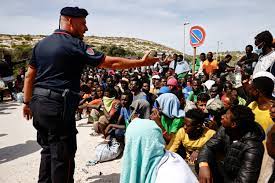Italy: Everyday survival a constant struggle for migrants

Rome: A recent study by the International Rescue Committee found that migrants in Italy face a dire situation when it comes to meeting their basic needs for shelter, food, and communication with loved ones.
Migrants arriving in Italy struggle to meet basic needs months after leaving reception centers and are less likely able to access vital support services, according to a study by an international humanitarian agency.
The International Rescue Committee (IRC) released a study this month that interviewed 598 migrants who arrived in Italy within the last three months and found that they face a desperate situation where they cannot access safe shelter, adequate information about their legal status, and food. The conditions persist even after they are transferred from arrival centers to relocation centers.

From file: Many migrants struggle with accommodation months after they arrive in Italy, according to a recent study by the humanitarian organization, International Rescue Mission | Photo: Cecilia Fabiano / AP / picture alliance
From file: Many migrants struggle with accommodation months after they arrive in Italy, according to a recent study by the humanitarian organization, International Rescue Mission | Photo: Cecilia Fabiano / AP / picture alliance
Almost half of those interviewed said that having a roof over their head was their main concern, with more than 100 of the respondents (18%) reportedly having no place to sleep. About half also said that access to information to keep them informed about their legal situation in Italy was a problem, while a slightly smaller percentage (36%) said that they did not have continuous access to phone or internet services needed to keep in touch with their families. Nearly a third (29%) said that they do not have access to adequate food.
“The report (also) underscores the ongoing challenges people encounter in accessing essential information and legal advice, crucial for understanding their rights and reclaiming control over their future,” Imogen Sudbery, IRC’s Senior Director of Europe Advocacy, said in a statement.
According to data from the Asylum Information Database (AIDA), by the end of last year, there were an estimated 71,882 people across more than 4,200 first reception facilities (CAS and first governmental centrers) in Italy.
Under the national public reception system governed by the Reception Decree, at these temporary reception centers, a process of first-aid, registration, and fingerprinting is done at “hot spots” before they are relocated to temporary accommodation shelters that run the range of small apartments, tents, or former army barracks.
Countries such as Italy and Greece, which are at the external borders of Europe and receive a disproportionately high number of migrant arrivals, have designated “hot spots” where various organizations work with government authorities to swiftly facilitate the asylum review process.
“With thousands of migrants and refugees leaving the hotspots just to fall outside of Italy’s official reception system … Fulfilling their basic needs and providing access to mental health support and information are fundamental steps in helping people regain control over their lives,” Susanna Zanfrini, IRC’s Italy Country Director, said in a statement.
Also read: Lampedusa: More than 3,000 migrants fill ‘hotspot’ to eight times its capacity
Due to its geographical location and southern Mediterranean coastline, Italy has found itself at the center of irregular migration arrivals both by land and by sea.
By sea, more than 105,000 people reportedly arrived in Italy’s shores in 2022, more than double the number of arrivals in the previous year. The IRC estimated that last year, the number of people arriving in Italy by land from Slovenia through the Balkan route reached 13,126.
Current government figures show that the majority of those arriving are from Guinea, Ivory Coast, and Tunisia. Since the beginning of the year, 12,330 unaccompanied minors have also arrived on Italy’s shores.
The Italian government has declared several states of emergency since April in response to the large number of arrivals and has repeatedly appealed to other European Union member states to relocate some of the arriving asylum seekers.





